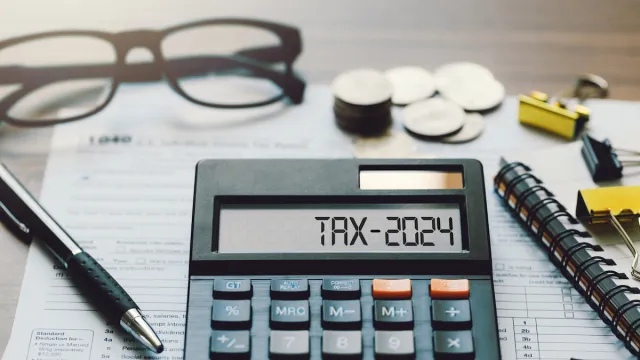IRS Issues New Alert With 7 Key Dates for Taxpayers—And the First Is Tomorrow

Starting tomorrow, you can officially start filing your 2023 taxes. As you begin to gather any necessary tax documents—income forms, standard deductions, and personal records—you may also want to take note of a few key filing dates that will help you stay on track and avoid paying any late penalties.
By April 15, the Internal Revenue Service (IRS) expects it will receive more than 128.7 million individual tax returns, per a new notice posted on the IRS website. Financial advisors and tax preparation companies like H&R Block and TurboTax will be busier than ever ensuring those returns are filled out correctly and on time.
RELATED: IRS Announces Major Tax Filing Changes for Next Year—Are You Affected?
To help streamline the process, the IRS is reminding taxpayers about seven key filing season dates and deadlines, the first of which is tomorrow. Have your calendar nearby? Here’s the full 2024 list straight from the IRS:
- January 12: IRS Free File opens.
- January 16: Due date for 2023 fourth quarter estimated tax payments.
- January 26: Earned Income Tax Credit Awareness Day.
- January 29: Filing season start date for individual tax returns.
- April 15: Due date of filing a tax return or to request an extension for most of the nation.
- April 17: Due date for Maine and Massachusetts.
- October 15: Due date for extension filers.
Do note that on Jan. 12, IRS Free File, as well as “participating software companies” will begin accepting completed tax returns. However, they will be held until the filing season officially begins on Jan. 29, the IRS explains.
RELATED: 4 Warnings About Using TurboTax, According to Experts.
Perhaps the most exciting and helpful feature the IRS has focused on is the Where’s My Refund? tool. The tracker, which can be used on a computer or cell phone, allows people to routinely check the status of their refund, including whether they may need to contact the IRS directly for more information, according to the IRS release.
Taxpayers can now also create an Individual Online Account via the IRS website. In the account, users can create payment plans, confirm whether the IRS processed their payment, and even cancel future payments. This tool is especially helpful for independent contractors or taxpayers who have to pay quarterly taxes.
In terms of filing, the IRS has a new paperless processing system that will accept more digital tax and non-tax forms than before—up to 125 million paper documents can now be filed online, per the IRS notice.
In other exciting news, taxpayers now have the option to file their taxes digitally and at no charge via the IRS directly. It’s all thanks to the IRS’ new pilot program called Direct File—however, only certain individuals are eligible. You can check your eligibility status online.
The improvements will hopefully make the 2024 tax season easier for everyone, including tax preparers and the IRS.
“As our transformation efforts take hold, taxpayers will continue to see marked improvement in IRS operations in the upcoming filing season,” IRS Commissioner Danny Werfel said in a statement. “IRS employees are working hard to make sure that new funding is used to help taxpayers by making the process of preparing and filing taxes easier.”
RELATED: For more up-to-date information, sign up for our daily newsletter.